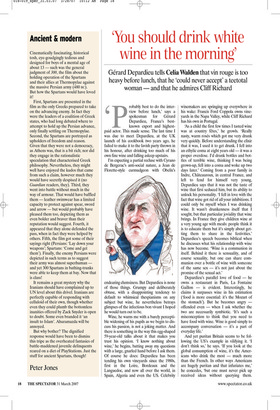‘You should drink white wine in the morning’
Gérard Depardieu tells Celia Walden that vin rouge is too heavy before lunch, that he ‘could never accept’ a teetotal woman — and that he admires Cliff Richard ‘Probably best to do the interview before lunch,’ says a spokesman for Gérard Depardieu, France’s bestknown export and highestpaid actor. This made sense. The last time I was due to meet Depardieu, at the UK launch of his cookbook two years ago, he failed to make it to the lavish party thrown in his honour, after drinking too much of his own fine wine and falling asleep upstairs.
I’m expecting a partial recluse with Cyrano de Bergerac’s anti-social nature, a Jean de Florette-style curmudgeon with Obelix’s endearing clumsiness. But Depardieu is none of those things. Grumpy and deliberately obtuse, with a disappointing tendency to default to whimsical thespianisms on any subject but wine, he nevertheless betrays glimpses of the infectious bon vivant I hoped he would turn out to be.
Wine, he warns me with a barely perceptible widening of his pupils as we begin to discuss his passion, is not a joking matter. And there is something in the way this egg-shaped 59-year-old talks about it that makes you trust his opinion. ‘I know nothing about wine,’ he begins, batting away my questions with a large, gnarled hand before I ask them. Of course he does: Depardieu has been tending his own vineyards since the 1980s, first in the Loire, Bordeaux and the Languedoc, and now all over the world, in Spain, Algeria and even the US. Celebrity winemakers are springing up everywhere in his wake: Francis Ford Coppola owns vineyards in the Napa Valley, while Cliff Richard has his own in Portugal.
‘As a child the first few times I tasted wine was at country fêtes,’ he growls. ‘Really nasty, warm rosés which got me very drunk very quickly. Before understanding the elixir that it was, I used it to get drunk. I fell into an ethylic coma at eight years old — it was a proper overdose. I’d drunk bottles and bottles of terrible wine, thinking I was being grown-up, fell into a coma and woke up two days later.’ Coming from a poor family in Indre, Châteauroux, in central France, and left to fend for himself very young, Depardieu says that it was not the taste of wine that first seduced him, but its ability to unlock his personality. ‘I fell in love with the fact that wine got rid of all your inhibitions. I could only be myself when I was drinking wine. It wasn’t drunkenness itself that I sought, but that particular joviality that wine brings. In France they give children wine at a very young age with meals: people think it is to educate them but it’s simply about getting them to share in the festivities.’ Depardieu’s speech becomes biblical when he discusses what his relationship with wine has now become. ‘Wine is a communion in itself. Behind it there is sensuality, and of course sexuality, but one can share communion over a bottle of wine with someone of the same sex — it’s not just about the promise of the sexual act.’ Depardieu’s parallel love of food — he owns a restaurant in Paris, La Fontaine Gaillon — is evident. Interestingly, he claims it surpasses wine in his estimation (‘food is more essential: it’s the Mozart of the stomach’). But he becomes angry offended even — when I ask whether the two are necessarily symbiotic. ‘It’s such a misconception to think that you need to have food with wine. Wine is good simply to accompany conversation — it’s a part of everyday life.’ And yet puritan Britain seems to be following the US’s example in vilifying it. ‘I don’t think so,’ he says. ‘If you look at the global consumption of wine, it’s the Americans who drink the most — much more than the French. In other ways Americans are hugely puritan and that infuriates me,’ he concedes, ‘but one must never pick up received ideas without querying them. There are some good wines in America some very fine Chardonnays, for example — but they are too expensive. They are also very fruity, with a very strong flavour, perhaps due to global warming. I do have vineyards over there which do all right.’ And English wine? ‘In 20 or 50 years’ time, when the planet has warmed up even further, I think that you will make great wines here.’ Depardieu tries to remain involved with his French vineyards at the most basic level, visiting them regularly and marvelling at the sheer unpredictability of winemaking. ‘To have 20 rows of vines one metre apart with some producing better wine than others is just fascinating to me. I try and do things as they did in the old days: I will cut off a small bunch of grapes from each part of the vineyard and squash them in my hand to try and spot any differences between the grapes. The texture of the earth is vital too. But you have to accept that not all the wines you make are going to be great wines. I don’t think you can ever guarantee success with wines — there are too many factors to contend with, and the wine lives and works in its own way.’ Depardieu believes there is a wine for every state of mind, for the smallest shift in the weather, for a rainy Thursday lunchtime or an overcast June evening. ‘If you are sad, for example, you can pick a fantastic wine, drink it without saying a word, and afterwards still not say a word and just make love.’ There are six Médailles d’Or awarded every year in France, the highest accolade in the wine trade. Last year, one was awarded to Depardieu’s Priorat. Does he, like many French, secretly think that reds are superior? ‘It totally depends. White wine is obviously better to drink in the morning, because red can be a little too heavy and you can’t drink much of it. Reds are undoubtedly more powerful, more of a foodstuff than white. Sometimes I like to just sit there alone and drink it, all the while feeling various sensations come alive.’ Could he ever imagine being with a woman who does not drink? ‘Of course — so long as I’m still drinking, who cares?’ He laughs, then looks serious as he rethinks his answer. ‘It is nice to drink with a woman though. I couldn’t really accept a teetotal woman, in the same way that I couldn’t accept a woman who doesn’t eat. And it’s so pretty to eat and drink: there is such elegance in those acts. I often think that women are blessed with a far more delicate palate, that they are more sensual creatures in general and therefore able to enjoy the divine liquid better than a big fat Frenchman like me.’ Depardieu is disparaging about Francis Ford Coppola’s wine, saying, ‘It’s really not my thing,’ and calling the film director’s foray into the wine trade ‘part of his megalomania’. Cliff Richard, he says, ‘is far braver. I would be very interested to taste his wine.’ It is on the subject of his own future that he descends into actor-talk: ‘The future is everything that the earth brings’; ‘wealth is not about possession — I am not interested in possessing things’, before explaining that he is ‘in love with someone who loves a flower’. This whimsy sits uneasily with his close friendship with Fidel Castro. ‘He’s much better,’ he tells me, ‘he’s gained some weight. I can’t see him at the moment because nobody’s allowed to see him, but we talk on the phone a lot. I sent him some wine — he has a favourite vintage which I make for him personally. Actually, we were laughing the other day because the wine in Cuba is just no good. The climate is wrong.’ Resisting the impulse to say that few of Castro’s political prisoners would be likely to enjoy the joke, or the wine, I let him go. Perhaps it would have been better to meet him after lunch. We might have had more fun, and less phoniness.
You can order Depardieu’s wines on 020 7449 4120 or at www.bibendum-wine.co.uk. Celia Walden edits the Daily Telegraph’s Spy column.











































































 Previous page
Previous page